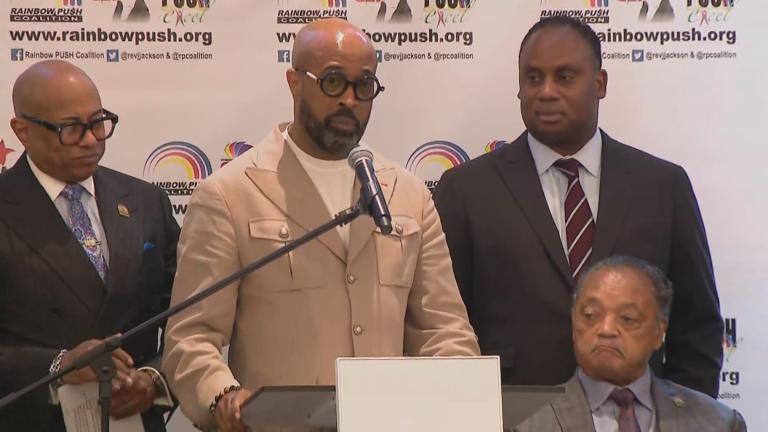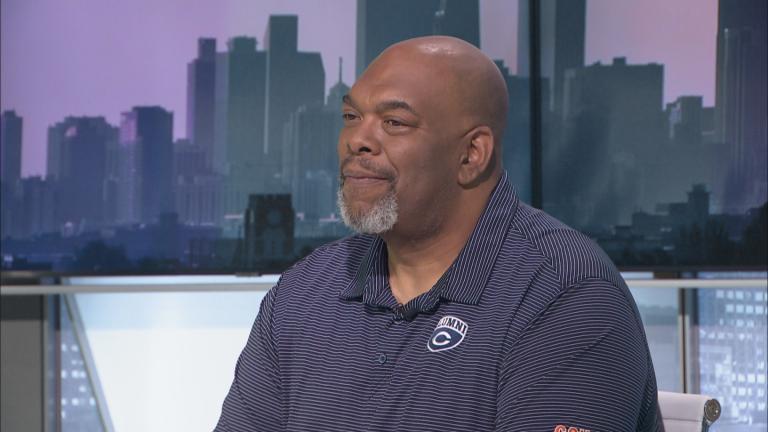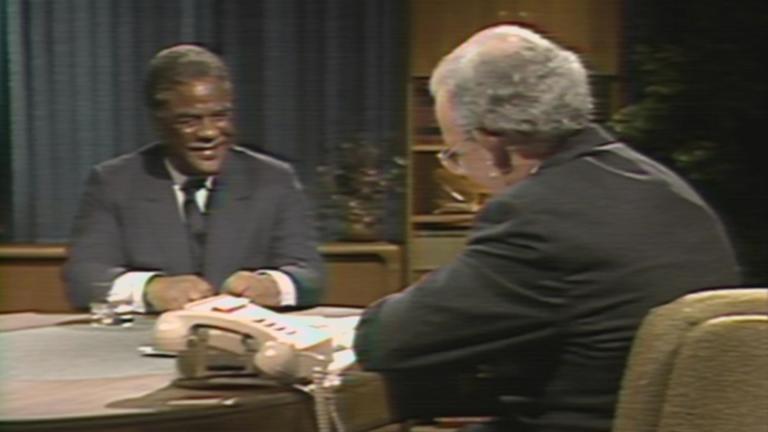Chicagoan J. Ivy is one of the most high-profile poets on the planet.
He has worked with A-list artists including Kanye West and Jay-Z, and of course Beyoncé. He even gave John Legend his “Legend” name.
Ivy’s spoken word album “The Light Inside” just earned him a third Grammy.
And last year he even performed at the United Nations.
Below is a Q&A with Ivy in which he talks about his poetic gift, his influences and his mission.
(The interview has been edited for length.)
WTTW News: You’ve often talked about the influence of your teacher Ms. Paula Argue and your mother. But I was just wondering when was it that you realized you had a gift with words, a gift for expression?
J. Ivy: High school is when I knew that I was good at writing. I knew I was good at expressing feelings on the page. I don’t know if I necessarily knew it was a gift when I first started, but I knew that it was something I found a lot of joy in and I knew I was good at it. But I’ll probably say as far as a gift, maybe at college is when I realized I had a gift.
And at that time did you have a clear idea of the stories you wanted to tell?
Ivy: For me, I was just exploring. Early on, … whatever thoughts, whatever stories, whatever feelings that was on my heart, I wanted to just express them. I didn’t really have a particular direction other than just expressing what I was feeling. And as time went on, I started to realize that I had an ability to touch people and I wanted to do that in a positive way. So I was always looking for ways to tell stories that would uplift people and make them feel good about that day.
And the stories you wanted to tell, were they always from your own life experience? Where did you draw your ideas from?
Ivy: It was personal. What was going on with family, friends, my hometown Chicago. It was also me thinking about who I was in the world as a man of color growing up in America and the struggles that come with that. So for me, there were personal stories, but then there was also looking at things historically. But then also looking around and seeing what’s happening in the world and drawing inspiration from things I was seeing in life.
Watch More: J. Ivy discusses his book “Dear Father: Breaking the Cycle of Pain” on “Chicago Tonight.”
Your work is infused with a sense of history. Where did your knowledge and understanding of the world and history come from?
Ivy: I definitely had, you know, there were my grandparents and aunts and uncles and my father, he wasn’t around as much, but that side of the family would always give information, suggest books, tell stories about growing up in Mississippi. And then when I got to college there were definitely mentors and big brothers that challenged me to expand my knowledge and who would give me books like “Soul on Ice” or “Malcolm X” or different things that would make me take a broader view. Gil Scott-Heron. So just things that would trigger my thinking, trigger my imagination.
There aren’t many high-profile poets. Who were your role models?
Ivy: Definitely Martin Luther King was a big influence on my life. I’m a hip-hop baby, so I love the storytelling of Slick Rick and Run DMC and Queen Latifah, … and so that was a huge influence. And then as far as poetry goes, Scott-Heron, The Last Poets and Maya Angelou — who’s the only other poet that I know of who has won Grammys — Nikki Giovanni, Sonny Sanchez, Amire Baraka. So there were a lot of poets that came before me. Even in Chicago, poets like Brenda Matthews and Reggie Gibson, the poets that blazed the trail.
I wanted to ask you about your process. You talk about unlocking the light inside, which I took to mean your poetic gift. Is that easy or difficult for you?
Ivy: I mean, it depends on the day. It’s just a matter of not being distracted, locking in, finding those quiet spaces and time in the day and really listening. I quiet myself and I listen, and when I do, the stories and the poetry just seems to flow out. And it’s almost like when I write, it’s almost like a puzzle, I’m putting this puzzle together. I may have a line here or line over there and then I’ll just start to piece it together.
When you started out did you have a clear idea of the stories you wanted to tell?
Ivy: When I started it out, it was more just what I knew. I was 17,18,19, you know, I didn’t have all the experience of the world. So it was where I came from, it was Chicago. It was a family. It was my upbringing. It was me coming into manhood. In adulthood, it was me looking at this struggle that my people faced for so long. So that was a big part of my writing. … It was built on using my art and my poetry to uplift and help find us in a better place and, and “The Light Inside” is absolutely that. It’s looking within. It was a continuation of “The Poet Who Sat by the Door,” and it was like we’ve opened the door, we’ve made it outside and there’s this light shining on us. But bigger than the light, the spotlight that is being put on me, bigger than that, it’s about looking within and keeping the main thing, which is the poetry.
You now have this incredibly elevated profile. Do you feel it as a responsibility or a gift?
Ivy: Both. It’s absolutely a gift because I feel like nothing is promised. So I don’t take it for granted. But I was just telling somebody yesterday that I found myself in this position and I do take on the responsibility of that and that’s something that an artist doesn’t necessarily have to do. You know, I really could just enjoy and keep producing and keep creating. But I do feel along with that, I do feel the responsibility to shine a light on this art form. And I think it because it’s meant so much to me. It’s done so much for my life. It’s done so much for people all around the world who not only perform poetry but are appreciators of it and lovers of the art. So, while I find myself in this position, which is a gift, I do find and see and the responsibility of making sure that I use the moment, use the position to break down doors for other folks and continue to shine a light on poetry.
There are so many people that enjoy your work, but do you have an audience in mind who you particularly want to reach?
Ivy: Everybody. I want to reach everybody. I’ve met so many people in the world from young to old, across the spectrum and demographic. And so for me, I never quite know what’s going to touch somebody or when it would touch them and how it will affect them. So for me, I always want to write in a way that will connect with everyone. I’ve been blessed to connect with people, so I always want to use my poetry to connect with people, and that may be an 80-year-old or it might be an 8-year-old who needs to hear something that will inspire them or, you know, in the 80-year-old case, maybe something that reminds them to tap into that light inside. So, I’ve never really thought of a specific demographic.
How did it feel to when won your third Grammy?
Ivy: Man, it’s incredible. It feels like a dream. It really feels like a dream. I went up on the stage, and Jimmy Jam handed me my Grammy and that was the first thing. The first thing I said, I was like, ‘Jimmy Jam handed me a Grammy.’ You know, it, it’s very surreal. So it was like I’m in a movie. Then at the same time it’s like jet fuel for the next moment. So it’s like, OK, what can I do next?
Which was my next question. What is next for you?
Ivy: Creating and connecting. So more music, more albums, more poetry, of course more film work. I’m looking to produce some ideas that I have. And I just want to keep creating and connecting and collaborating.








